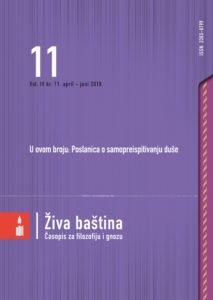Kontroverze oko Ibn Arebijevog Fususa: Faraonova vjera
Controversies over Ibn al-‘Arabī’s Fuṣūṣ: The Faith of Pharaoh
Author(s): Carl ErnstContributor(s): Haris Dubravac (Translator)
Subject(s): Islam studies, Middle-East Philosophy, Philosophy of Religion
Published by: Fondacija “Baština duhovnosti”
Keywords: Ibn 'Arabi; Fususu al-Hikam; the Pharoh's faith; al-Dawwānī; ‘Alī al-Qārī; the Sufi interpretation of Qur’an;
Summary/Abstract: The majority of commentators of Qur'an hold that Pharaoh was doomed to Jahannam, whereas such interpretation was not always accepted in Sufi circles. Ibn 'Arabi's thesis of the validity of Pharoh's confession of faith, which occupies only a couple of pages in the Fusus al-Hikam, has attracted a remarkable amount of comment from both his supporters and detractors. To support Ibn 'Arabi's view, perhaps the most convenient example is a brief treatise on the faith of Pharaoh written by al-Dawwānī. A jurist from the 16th century, ‘Alī al-Qārī, attempted to refute this work in a detailed commentary. This text briefly presents arguments of both authors about this issue, as well as the view of Ibn 'Arabi him-self. Finally, it becomes clear how this issue is related to the issue of Sufi interpretation of Qur'an, since the underlying issue, though not stated directly, is that of Scriptural exegesis. According to the author, the faith of Pharaoh actually must be understood in the context of the Fusus, where it concludes the startling interpretation of Moses and Pharaoh as manifestations of polar tensions in the Divine Being. The faith of Pharaoh is merely one aspect of Ibn 'Arabi's reading of the Scripture, who thought that the divine mercy would suffer no limitations. The variance of this Sufi interpretation from the standard consensus constitutes a perennial tension within each religious tradition.
Journal: Živa baština: časopis za filozofiju i gnozu
- Issue Year: IV/2018
- Issue No: 11
- Page Range: 40-46
- Page Count: 6
- Language: Bosnian

